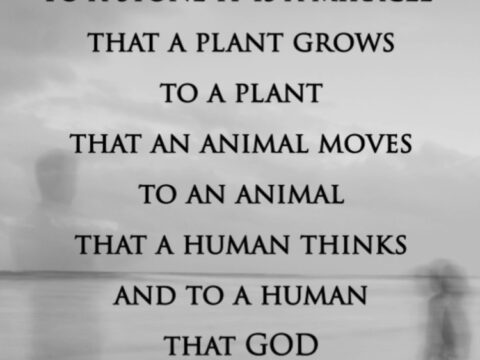
And this is life eternal, that they might know thee the only true God, and Jesus Christ, whom thou hast sent.
John 17:3
The knowledge of which Jesus speaks here evidently bears an entirely peculiar character. It is different from all other knowledge that man can acquire, not in degree, but in principle and essence. This is clearly shown if we compare the two types of knowledge for a moment. The knowledge of God, referred to here by Jesus, differs from the knowledge of created things in origin and object, in essence and fruit.
It differs from it first of all in origin, for it is due to Christ alone. All other knowledge we acquire in a certain sense through our own understanding and judgment, through our own efforts and research. But the knowledge of the one and true God we, as children, must let Christ give it to us. It is nowhere to be found outside Him, in any scientific school or among any renowned philosopher. Christ alone knew the Father. After all, in the beginning he was with God, lay in his lap and saw him face to face. He was God Himself, the reflection of His glory and the expressed image of His independence, the Father’s own, only begotten, much-loved Son, in whom He had all His pleasure (Matt 3:17, John 1:14, Rom 8:12, Heb 1:3). Nothing in the nature of the Father is hidden from the Son, because He shares the same nature, the same attributes, the same knowledge. No one knows the Father but the Son (Matt 11: 27).
And this Son hath come unto us, and declared unto us the Father. He has revealed the name of his Father to man; therefore He became flesh and appeared on earth, that He might make known to us Him that is true (1 John 5:20). We did not know God and did not even enjoy the knowledge of His ways. But Christ has made us know the Father. He was not a philosopher, a scientist or an artist; His work was to reveal the name of the Father to us. And that He has done, completely, throughout His life. He revealed God in His words, in His works, in His life, in His death, in His person and in all that He was and did. He never said or did anything except what He saw the Father doing. Whoever saw Him saw the Father also (John 4:34, 8:26-28, 12:50, 14:9).
He received the name Jesus from God Himself, because He was to save His people from their sins (Matt 1:21). He is called Christ, because he is the Anointed of the Father, chosen and appointed by God himself to all his offices (Is 42:1, Matt 3:16). And He is the Anointed One, because He did not come in His own name like so many false prophets and priests, He did not exalt Himself and did not accept the honor Himself; but because the Father so loved this world that He gave His only begotten Son, that whoever believes in Him should not perish but have eternal life (John 3:16).
Those who accept Him therefore receive the right and the authority to bear the name of the children of God (John 1:12). They are born of God, they are partakers of the divine nature, they know God in the face of Christ, His Son. No one knows the Son except the Father, nor does anyone know the Father except the Son, and whom the Son wills to reveal (Matt 11:27).
Secondly, the knowledge of God differs from all other knowledge in its object. Because the latter, especially in recent times, be ever so broad in scope, it is limited to the creature and does not find the infinite. There is a revelation of God’s eternal power and divinity also in the works of nature. But the knowledge of God obtained therefrom is slight, obscured, mixed with error and, moreover, not valued highly. For men, knowing God by nature, have not glorified or thanked Him as God, but have become perverted in their imaginations and have changed the glory of the incorruptible God into the likeness of the creature. The world is both a concealment as well as a revelation of God (Rom 1:20-23).
But here, in the high-priestly prayer, the One appears before us, who forsakes all finite things and speaks of the knowledge of God! God the object of human knowledge, who can grasp that? God, who is the Infinite and the Incomprehensible One; who is not measured in time nor in eternity; before whom the angels cover their faces with their wings; who lives in an inaccessible light, whom no man has seen or can see! He, the object of human knowledge, of the man whose breath is in his nostrils and who is less than nothing and more than vanity! He would know God, whose whole knowledge is just shreds and patches! For all his knowledge, what does he know? What does he know in his ear, in his being, in his purpose? Does not mystery surround him from all sides? Does he not always stand at the borders of the unknown? And this man, a poor, weak, wandering and darkened creature, would know God, the high, holy, only, omnipotent God?!
It is far beyond our understanding, but Christ speaks of it, who has seen the Father and explained Him to us. We can rely on Him, and His testimony is true and worthy of all acceptance. If you want to know, O man, who God is, do not ask the wise, the scholars, the researchers of this age, but look at Christ and hear His word. Say not in thy heart, Who shall ascend into heaven, or who shall descend into the abyss? For the word that Christ preaches is near you. He himself is the Word, the perfect revelation of the Father. As He is, so is the Father, equally just and holy, but also equally full of grace and truth. At his cross the full contents of the faith of the Old Covenant are revealed: Merciful and gracious is the Lord, long-suffering and great in benevolence. He will not punish us for our sins, nor reimburse us for our iniquities. For as high as the heavens are above the earth, so great is His mercy toward them that fear Him. As far as the East is from the West, so far does He take our transgressions from us. As a father takes care of his children, so does the Lord take care of those who fear Him (Ps. 103:8-13). And beholding the glory of Christ in the mirror of His word, we joyfully exclaim: We know Him because we are known by Him; we love Him because He first loved us (1 John 4:19).
In the verse from the High Priestly Prayer Jesus does not speak of knowing (as in mere information), but of knowing God. The difference between the two is great. To know a lot about a creature, a plant or an animal or a human being, a country or a people, from books, is something completely different from knowing it from one’s own observation or personal knowledge and experience. Such information is simply based on someone else’s description of the matter. Knowing, in this sense, is a matter of the head only. But real knowing involves a personal concern and involvement and an activity of the heart. [As Jonathan Edwards puts it, there is a difference between knowing that honey is sweet and tasting its sweetness].
It is true that a description can be found in the Bible about the knowledge of God which Christ has given, and so it is possible to have information about God which is different from the knowledge intended by Jesus. There is a knowing of the Lord’s will, without the willingness of the heart to do that will (Luke 12: 47, 48). There is a calling of “Lord, Lord,” that in no way opens the entrance to the kingdom of heaven (Matt 7: 21). There is a faith, like that of the devils, which does not arouse love, but fear and trembling (James 2: 19). There are hearers of the word, who do not wish to be doers and therefore will be beaten with double stripes (James 1: 23).
When Jesus speaks here of knowing God, He has in mind a knowledge, similar to the one He Himself possesses. He was not a theologian by profession, nor a doctor or professor of divinity. But He knew God by direct, personal sight and insight. He saw Him everywhere, in nature, in His word, in His service. He loved Him above all things and obeyed Him in everything, even unto the death of the cross. His knowing of the truth was one with his doing of the truth. And knowledge was united with love.
No, to know God does not consist in knowing much about God, but it lies in the fact that we have seen Him ourselves in the face of Christ, that we have met Him on our path of life, and have personally become acquainted with His virtues, His righteousness and holiness, His mercy and grace in the experience of our souls.
That is why this knowledge, as opposed to other sciences, is called the knowledge of faith. It is not the fruit of intellectual investigation and reflection, but of childlike and simple faith, of that faith which is not only a sure knowledge but also a firm trust that not only to others, but to me also, have been granted forgiveness of sins, eternal righteousness and salvation by God, through pure grace, solely on Christ’s merit. Only those who become like children will enter the kingdom of heaven (Matt 18:3). Only the pure in heart shall see the face of God (Matt 5:8). Only those born again of water and the Spirit shall enter God’s kingdom, John 3:5. If any man shall do the will of God, he shall know the doctrine of Christ. They that know his name shall trust in Him, Ps 9:11. And God is known in proportion to the extent that He is loved.
If we understand the knowledge of God in this way, it is no wonder, that its effect and fruit is no less than eternal life. Does not Ecclesiastes truthfully say: in much wisdom is much sorrow; he who increases his knowledge, increases his sorrow; to make many books is no end; and to read much is weariness of the flesh (Eccles 1:18, 12:12).
Knowledge is power – we understand that, at least to a certain extent. He who knows, rules. All knowledge is a triumph of the spirit over matter, a submission of the earth to the dominion of man. But knowledge is life – who can understand that? And yet, already in the natural sphere, knowledge increases the depth and richness of life. The more comprehensive the awareness, the more intense the life. The inanimate creatures do not know, and they do not live. When consciousness is awakened in animals, their lives also gain in content and extent. Among humans, the richest life is that of the one who knows the most. What is the life of the sick in spirit, of the ignorant, of the simple, of the undeveloped poor and limited, compared to that of the thinker and poet! But however much difference there may be, it is only a difference of degree, the life itself does not change; it always, with the greatest scholar as well as with the simplest day laborer, goes down in death, for it is fed only from the finite sources of this world.
But here we are talking about knowledge, not of any creature, but of the one true God.
If the knowledge of visible things already enriches life, how much more will the knowledge of God be the life of the dead? For God is not a God of death and the dead, but of life and the living. All those whom He created in His image and restored to His community are thereby raised above death and mortality. He that believeth in me, saith Jesus, though he were dead, shall live: and whosoever liveth and believeth in me shall never die (John 11:25, 26). Knowing God in the face of Christ brings eternal life, joy beyond measure and heavenly bliss. Not only does it result in these, but the knowing of God is itself a life anew, an eternal life, and a blessed life.
Herman Bavinck. Magnalia Dei.



